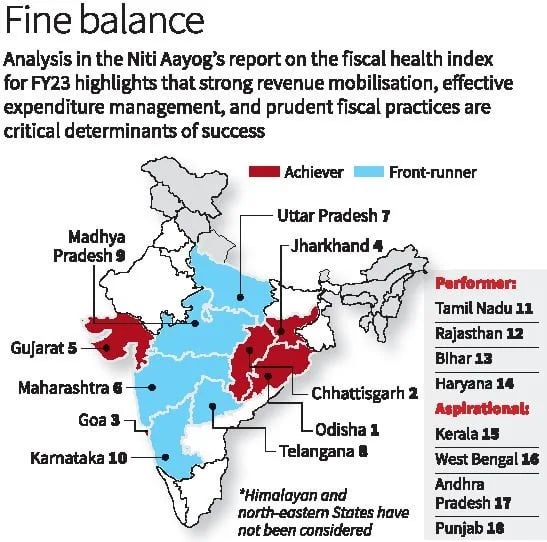Syllabus: GS2/Polity and Governance
Context
- NITI Aayog has released the first Fiscal Health Index (FHI) report.
About
- The report titled “Fiscal Health Index 2025” ranked States for 2022-23.
- It covers 18 major States that drive the Indian economy in terms of their contribution to India’s GDP, demography, total public expenditure, revenues, and overall fiscal stability.
- It will be an annual publication and offers a systematic approach to assess the state’s fiscal health, identify areas for improvement, and promote best practices across states.
- Sub Indices: Quality of Expenditure, Revenue Mobilisation, Fiscal Prudence, Debt Index, and Debt Sustainability.
Major Findings
- Top Performing: Odisha, Chhattisgarh, Goa, Jharkhand and Gujarat have emerged as top-performing ‘achievers’ among the States.
- It displays strong fiscal health, excelling in revenue mobilization, expenditure management, and debt sustainability.
- Aspirational States: Haryana, Kerala, West Bengal, Andhra Pradesh, and Punjab.
- These states face high debt, large interest payments, weak revenue generation, and inefficiencies in capital expenditure, with reliance on non-tax revenue impacting their fiscal health and rankings.


Conclusion
- The report will be instrumental in helping policymakers make informed decisions.
- There is a need for the States to follow a stable fiscal path for balanced regional development, long-term fiscal sustainability, and prudent governance.
- The FHI report helps to promote a more integrated approach to fiscal health reinforcing the shared responsibility of both levels of government.
Source: PIB
Previous article
Donald Trump Bans CBDC in US
Next article
Use of Loudspeakers is Not Essential to Religion: HC